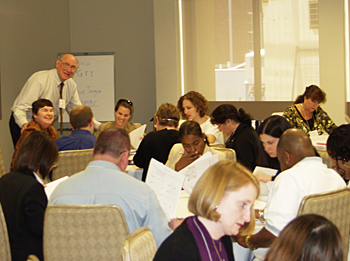Conference on College and University Teaching, “Learning by Design,” April 17-18, at Clayton Hall. The conference was attended by 260 university professors and graduate students, representing 58 institutions., with 53 participants from UD. The conference was cosponsored by the University of Maryland, College Park, the University of Delaware Library and UD's Institute for Transforming Undergraduate Education.
The conference highlighted instructional design, aligning objectives, assessment and instruction to support student Learning by Design. Participants discussed instructional topics ranging from course design, critical thinking, problem-based learning (PBL), and student engagement to instructional technologies and assessment of student learning. The conference also offered participants a forum for networking and the exchange of instructional practice across disciplines and
institutions.
Presenters representing 40 institutions shared their scholarly teaching via 63 concurrent sessions and 21 poster presentations. The sessions reflected a high level of quality; colleagues from 20 institutions peer-reviewed over 100 proposals. A number of sessions presented both undergraduate students' and faculty's perspectives on the learning process. Two sessions featuring instructional technologies were held at the Student Multimedia Design Center at the University of Delaware Library.
According to one participant, “The conference provides topics that are extremely relevant to improving the quality of higher education-- that is, to make learning more relevant and better prepare our students for entering the work force.”
The conference was preceded by a special academic career development event, sponsored by the UD Office of the Provost and the University of Maryland, for graduate students, focused on their future roles as educators of undergraduate students. One graduate student said, “Participating in the academic career sessions, affirmed for me that I wanted to be a faculty member and had made the right career choice. Sometimes you get doubts, particularly when you're in a research-intensive field.”
“Conference attendance has continued to grow and this growth reflects institutions' focus on quality student learning and teaching, and support of faculty,” according to Gabriele Bauer, assistant director, Center for Teaching Effectiveness (CTE), and conference organizer. “Participants were engaged in high quality sessions and motivated by the higher education leadership of nationally recognized experts such as Virginia Anderson, Milton Cox, Dee Fink, Jerry Gaff, Laurie Richlin, and Todd Zakrajsek. It's a unique opportunity to talk teaching with these colleagues and share your scholarly teaching,” Bauer said.
Based on feedback, the conference met the participants' needs and in many instances exceeded their expectations. One attendee stated, “I have now concrete ideas for motivating my faculty colleagues to systematically assess student learning on our courses.” Another participant said, “I'll consider video documentary projects for my summer study abroad students to Rome, and I'll pursue it with my study abroad colleagues.”
Conference planning and execution is a team effort that benefits from the collective expertise and support of the Office of the Provost, the Office of Undergraduate Studies, the Division of Professional and Continuing Studies, Conference Services and the Center for Teaching Effectiveness. Bauer said. .
The 2009 Lilly-East Conference on College and University Teaching will be held April 15-17, at UD in Clayton Hall.
The following University of Delaware faculty, staff and graduate students participated:
- Deborah Allen, biological sciences, Hal White, chemistry and biochemistry, and George Watson, associate dean, arts and sciences: Problem-Based Learning: Moving from Design to Reality;
- Gabriele Bauer, CTE: Developing a Teaching Statement;
- Carolyn Bitzer, Womens' Studies and undergraduate students, Action! Using Video Documentary Projects to Enhance Learning;
- Bridget Brennan, Heather Schmidt, and James Wingrave, chemistry and biochemistry: Fostering the Facilitation of Collaboration: Graduate Teaching Assistant Instructional Support (poster);
- Marianne Green, UD's Bank of America Career Services Center: Designing Your Academic CV and Cover Letter;
- Jessica Hodge, sociology and criminal justice, and Nicole Ruggiano, urban affairs and public policy: Discussing Effective Job Search and Interview Strategies;
- Hye-Shin Kim, Rosetta LaFleur, and Karen Schaeffer, fashion and apparel studies: Technology and Decision-making in the Classroom: Simulating Industry Practice (poster);
- Jann Lightcap, UD Online, and Barbara Frey, University of Pittsburgh: Using Learning Principles to Create and Evaluate Multimedia Projects;
- Jann Lightcap, UD Online, and Penny Rodrick-Williams, entomology and wildlife ecology: Thinking about Developing an Online Course?
- John McNutt, urban affairs and public policy, Cynthia Paris, and Christine Barthold, individual and family studies, Engaging Students in the Virtual Public Sphere;
- Beth Morling, psychology: What to Do When They Say, “I'm Just Not a __ Person”;
- Cynthia Paris and Christine Barthold, individual and family studies: Creating Web-based Communities of Practice to Increase Cross-content Synthesis (poster);
- Vice Provost Havidan Rodriguez, panelist, The Scholarship of Learning and Teaching;
- Heather Schmidt, Bridget Brennan, and James Wingrave, chemistry and biochemistry: How to Begin: Collaborative Introductory Laboratory Activities;
- Mark Serva, accounting and Management Information Services: Using Wikis to Enhance Student Learning;
- Katherine Skalak, geological sciences, and Marguerite McDonald, chemistry and biochemistry: Journaling and How Students Learn;
- Jeffrey Spraggins, chemistry and biochemistry: Introducing Science Students to Cutting Edge Research through PBL Activities (poster);
- Karen Stein and Kathleen Pusecker, Office of Educational Assessment, Leadership Training, Organizational Culture, and Outcomes Assessment;
- Bahira Trask, Laura Thompson Brady, Bethany Willis Hepp, and Barbara Settles, individual and family studies, Promoting Mentoring Relationships Between Faculty and Graduate Students;
- David Wilson, political science and international studies, and undergraduate students: Teaching Students Research Methods Using “Clickers” Outside the Classroom;
- James Wingrave, Brad Bauer, Kristin Nuzzio, and Bridget Brennan, chemistry and biochemistry: Extending the PLTL Model to a Class of 1000 (poster); and Angela Wolfe, psychology: Collaborative Learning: How to Make It Work.


